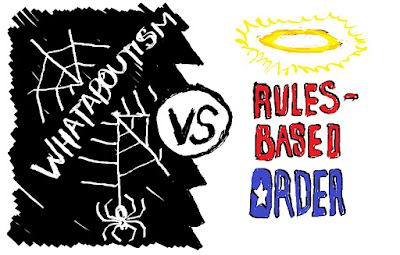Russia and China’s dismissals of the US and the West’s authority in the international system (the rules-based order) by pointing to Western wars such as the Iraq War of 2003 or the 2011 bombing of Libya are in turn rejected in Western circles as ‘whataboutism’. But is this succinct reply a sufficient defence of the West?
Someone saying 'what about', and bringing up the other fellow's own failings or sins, like any ad hominem attack, is not necessarily a false argument. If someone’s whole point in an argument is that you are a thief, and you are in fact a thief, then their argument is in fact valid.
In logic, ‘Whataboutism’ is only a false argument when its structure contains a conclusion that does not really follow, for example, 'you are a thief too, therefore I am not a thief'.
No-one really says anything so absurd, so to accuse someone of this logical fallacy is ridiculous. The Russians and Chinese have never made the claim that they are innocent of crimes because they can show the West also commits crimes.
Western hypocrisy is the point
When Russia and China defenders point to the West’s hypocrisy, they are never asserting a false conclusion or falsely claiming to refute a Western allegation. They are just refusing the discussion entirely, because they have another topic they would prefer to talk about.
To claim this refusal of the subject, in favour of attacking the West’s hypocrisy, is an ad hominem fallacy, is no more correct than to claim that Russian diplomats refusing to talk about hot dogs is an ad hominem attack on the intellects of American barbecue-goers, and that Russian answers must be about hot dogs or else they are doing ‘whataboutism’. If you think someone is talking nonsense, you don’t have to address the minutiae of it. If you want, you can wisely change the subject to their credibility, which should have been established first anyway.
As soon as ‘what about Iraq?’ is asked, the United States’ moral authority and its right to confront other nations on moral issues in the first place becomes the subject of the discussion. Under those conditions, whataboutism is a valid argument. We are rewinding the discussion to where it should really start. We are judging the moral character that the US and the West are tacitly claiming (which they need to establish first, before appointing themselves to accuse other nations), so facts that hurt their character are valid to bring up.
'What about whataboutism?'
In fact, invoking the term ‘whataboutism’ when facing Russian and Chinese claims about the West may itself be a form of ‘whataboutism’ (in this case it takes the form ‘what about whataboutism?’), and an example of this as a real logical fallacy. Western apologists in this case really are falsely inferring that they have refuted Russian and Chinese accusations of Western hypocrisy by dismissing them as logical fallacies, when the accusations may not be logical fallacies but distinct and accurate claims that hurt the West's standing.
Someone being guilty of a crime himself arguably destroys his moral authority to judge others committing the same crime and removes his right to take the podium to talk about another fellow's crime. His own actions in committing the crime make his moral authority and statements on anyone else’s crimes dubious, and call his motivations into question. It may show that he is actually just looking for a monopoly on force or the right to commit crimes, rather than sincerely addressing crimes.
When used to challenge someone’s moral authority or ideology, ‘whataboutism’ is a valid and healthy starting point before addressing someone’s claims in the first place. It is not only logically valid but devastating to an opponent, if they cannot withstand it.
WHOAREYOUism
Whataboutism is not a rude interruption to the West's accusations against any regime. It is a legitimate attempt to rewind the conversation to where it ought to begin. The correct phrasing actually goes: 'who are you'?
If the West’s claim is that it represents some kind of moral purity or higher authority, which is indeed its claim when it uses the term ‘rules-based order’ to describe a vision of itself safeguarding international rules and norms, then for Russia and China to point out that it is untrustworthy because of its hypocrisy is fatal to the West.
‘Whataboutism’ is the winner. A ‘rules-based order’ proposed by cockroaches is no way to start cleaning the world, because their very nature disqualifies them from talking about it.

